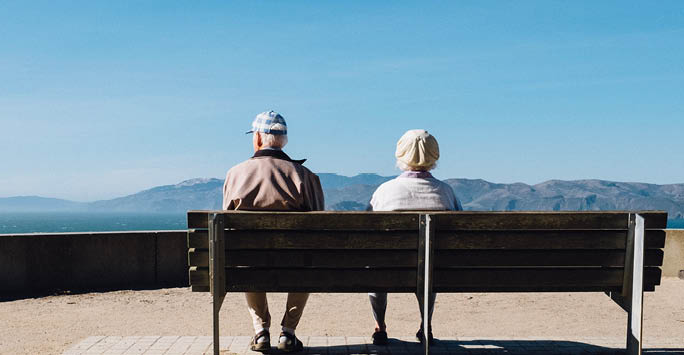
Professor Susan Pickard asks 'what is the meaning of old age?'
What is the meaning of old age? As a small child spending my holidays in the company of an 80-year-old grandmother, this was my version of the question: ‘What is the meaning of life?’ My fascination with this question stuck and it could be said that I have made a career out of exploring it. More recently it has underpinned my new ESRC-funded research project on frailty and ethnicity which looks at the multiple factors, social and physiological, that contribute to frailty in later life as well as those that serve as sources of strength and resilience. I will return to this project later in the piece.
But first, some more background to how this project came about. My work over the past decade has followed three distinct strands which are all aspects of that childhood curiosity. The first strand asks: How do we as a society view old age? This has led me to explore cultural narratives about ageing and old age, media representations, assumptions embedded in medical discourses such as frailty, narratives (often feminist in approach) that resist the association between ageing and decline, as well as the way older people themselves internalize, resist or subvert these dominant narratives.
One example of a powerful social discourse is that of ‘successful ageing’, a discourse which emerged in the late 1980s in the context of neoliberalism. This has unfortunately squeezed out richer narratives of ageing well together with depictions of the life course which value maturity and wisdom available to all no matter their circumstances. Instead, it has substituted them with a narrower emphasis on retaining individual health and productivity in later life. This version of success in later life exhorts us to remain youthful and keep the changes of old age at bay. Moreover, as poor health and frailty in later life are associated with inequalities of all kinds generated earlier in the life course, the discourse both ignores structural issues and celebrates the achievements of a privileged few, and thus in itself creates further social injustice in later life (Pickard, in press).
The second research strand concerns health and asks: Is it possible to be old and healthy? Whilst the obvious (and, I believe, correct) response is a resounding ‘yes!’, a deeper look discovers something enigmatic about health in old age. Indeed, geriatric medicine developed as a clinical discipline in the twentieth century around its unique ability, as a mixture of art and science, to understand older bodies as qualitatively different to younger bodies and to detect the fine gradation between health and illness in old age.
In contemporary society, powerful trends both within clinical medicine and biogerontology (which is the science of the biological ageing process) assess older bodies in terms continuous with younger bodies and view the changes of age as indistinguishable from those of chronic illness. With medicine exerting an enormous sway over cultural narratives, this has undoubtedly fed into the discourses of ‘successful ageing’, including the social value placed on youth. It has also fed the ‘master narrative of decline’ (Gullette, 1997), a cultural view that sees ageing through the life course entirely in terms of deficit and loss.
The antidote to such an ideologically-driven, ageist perspective lies in foregrounding older people’s own experiences. Listening to the voices of older people themselves reveals that embodiment in old age can be experienced very positively including in conditions such as frailty. In this sense, meaning in old age and the social meaning of old age are jarringly unaligned.
The third strand can be summed up as: What are the varieties of experience in and of old age? This strand of my research is particularly concerned with the experiences of those who have been traditionally marginalized by dominant concepts and understandings. Within this I have been interested in women in particular and, latterly, minority ethnic communities. Listening to the voices and exploring the submerged discourses associated with such individuals and groups reveals a rich diversity of experience and also unearths powerful resources for resilience and strength. These experiences challenge the unitary nature of medical categories such as frailty or the menopause which have been constructed from research into dominant groups in the global north.
Returning to my current ESRC-funded project all three interwoven strands inform its aims and methods. With an interdisciplinary team that includes expertise in medicine, public health, GP education, philosophy, EDI and community advocacy, as well as sociology, we are exploring the experiences of health and illness, frailty and resilience in older people from diverse ethnic communities. Through this work we hope to make several key contributions to improving the lives of older people. These include further analysing the causes of health inequalities in later life and making policy suggestions as to what can be done to reduce them. In addition, we hope to shift medical understanding of frailty, its causes and trajectories, from a unified category to something more diverse. Further to that, we are developing cultural competence tools to aid health care practitioners in their interaction with older patients so that they can more fully understand both the reasons for and combinations of vulnerability and strength in later life.
Find out more
- View Professor Susan Pickard's staff profile
- Visit the Frailty and Ethnicity research project website
- Visit the Centre for Ageing and the Life Course webpages
References
Gullette, M (1997) Declining to Decline: Cultural Combat and the Politics of the Midlife, University of Virginia Press, Charlottesville.
Pickard, S (in press; due for publication 2024) Successful ageing. In Twigg, J and Martin, W (eds) Routledge Handbook of Cultural Gerontology (second edition).